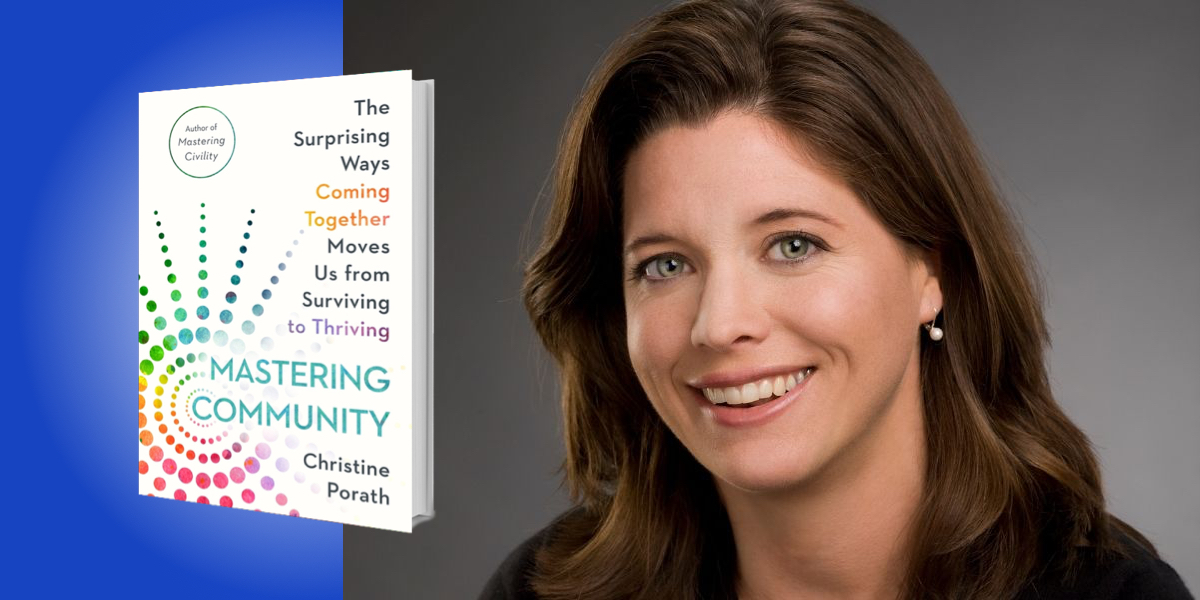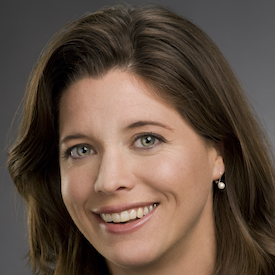Christine Porath is Associate Professor of Management at the McDonough School of Business at Georgetown University. She is a globally sought-after speaker and has advised organizations like Google and the International Monetary Fund in their pursuits to improve workplace culture.
Below, Christine shares 5 key insights from her new book, Mastering Community: The Surprising Ways Coming Together Moves Us from Surviving to Thriving. Listen to the audio version—read by Christine herself—in the Next Big Idea App.

1. Community is the cure.
In 2008, my brother Mike and his wife Sarah had a truly terrible, life-changing day. In the morning, a doctor informed them that their unborn child was missing a kidney, and possibly other organs. That afternoon, they returned home to more devastating news: their two-year-old daughter Annabel had a rare chromosome disorder, dup15q, and her mind would probably not develop beyond that of a five-year-old child.
Feeling lost, scared, and alone, Mike turned to Google. He clicked on an old PDF containing six stories from parents whose children experienced similar disabilities, where he was offered reason for hope. If these parents could cope and even find joy and humor in the process, maybe Mike and his wife could do the same. Mike realized that health solutions can be simple, and the best ones often reflect lived experience rather than professional expertise. Family and friends are great, Mike told me, but people facing health challenges need a tribe.
In 2014, Mike and Sarah bootstrapped a new venture they called The Mighty, a digital media company connecting people facing disease, disability, and disorders. Since then, The Mighty has grown from a tiny tribe of several dozen to the largest, most engaged healthcare community in the world. While the groups under the umbrella of The Mighty were created to address specific health needs, beyond that, they were solving the fundamental societal problem of isolation.
The societal prevalence of isolation translates to the workplace. Many years ago, my colleague Tony Schwartz and I asked over 20,000 people across diverse industries and organizations worldwide about their quality of work and life. The fundamental question we sought to answer was: what stands in the way of being more satisfied and productive at work?
Our study found that 65 percent of people don’t feel any sense of community at work. When people feel connected with their colleagues, we found that they are 74 percent more engaged and 81 percent more likely to stay with the organization. Yet organizations consistently underestimate the value of community. Our need for affiliation, or connection, is one of our three most fundamental needs, along with autonomy and competence. Of these three, connection is arguably the most important.
“Our need for affiliation, or connection, is one of our three most fundamental needs.”
2. Our community rubs off on us.
One morning, newly minted CEO Jeremy Andrus drove into the parking lot of his office at Traeger, a company specializing in wood pellet outdoor cooking grills. It was surrounded by fire trucks and policemen: one of Traeger’s eighteen-wheel big-rig trucks was aflame, and Andrus felt sure it was arson.
Early into his leadership, Andrus found obstacles to creating a community-based work culture. One hurdle was that the majority owner was so abrasive that he created a company-wide atmosphere of fear. Andrus made several attempts to change the culture, but after the owner blew up on him during a board presentation, Andrus had to do something radical. He and a venture team bought the owner out, closed the Oregon headquarters, and moved it to Utah in 2015, inviting only those that were competent and a cultural fit.
Andrus invests in the culture in many ways. He now spends time with job applicants to assess their values before hiring them. Employees cook together (one of their values) every Monday morning, and lunch on Tuesday through Friday.
It took Traeger 26 years to get to $70 million in revenue. In seven years with Andrus as CEO, the company has grown to $700 million in revenue. He credits culture: “We’re still selling a wood pellet grill. We’re selling a better one, but we didn’t come in here and say, ‘We’ve got to completely change what we’re doing.’ We’re still positioned the same way in the market. The only variable was the team and culture. And I think it mattered.”
As Andrus’s experience reveals—and as our research shows—disrespect, disregard, and incivility erode people’s sense of belonging, and create a workforce that feels isolated, betrayed, and belittled. When the social fabric of the community is damaged, there are real and measurable effects on performance. If a community is toxic, we can expect to stay sick and pass the virus on to others. The good news is that civility is contagious, too.
“Disrespect, disregard, and incivility erode people’s sense of belonging, and create a workforce that feels isolated, betrayed, and belittled.”
3. Self-awareness benefits people and communities.
Earlier in his career, Aman Bhutani, CEO of GoDaddy, realized that he had a habit of responding (even to routine requests) with a sense of great urgency, especially if the requests came from an important person at work. In response, he would fire an email to as many as 150 people. Sometimes it took several days to hear from all these people. Meanwhile, Aman might already have responded to the request, so all of the time and energy he sucked from others often ended up being for nothing.
Aman knew that he was much more effective at his job when he was calm, so he created a spreadsheet to track this. As a result, he said, “I found that I was excited/happy or excited/sad four to five times per week. Within five to six months, I realized that it took me 24 to 48 hours each time this happened to get calm.” He began to make changes, and has improved his behavior.
Although self-awareness is a foundational skill for success, most don’t invest in it. Based on data collected by organizational psychologist Tasha Eurich, a whopping 95 percent of people believe they’re self-aware—yet only 10-15 percent actually are. Those who are self-aware are happier, more confident, and better communicators. They have stronger and deeper relationships. Their communities win, too, as people who are self-aware tend to perform better at work. In a study of several hundred leaders and their direct reports, Eurich and I found that leaders who were more self-aware were rated as more effective. Employees whose leaders had self-awareness were happier too, reporting a stronger commitment to their organization and sense of belonging.
Self-awareness about the extent to which one is thriving matters for its potent, contagious effect on a tribe or community.
“A whopping 95 percent of people believe they’re self-aware—yet only 10-15 percent actually are.”
4. Negativity is infectious.
Russell Wilson, former quarterback of the Seattle Seahawks and Super Bowl champion, threw a heartbreaking interception in the 2015 Super Bowl. His team was down only four points, with a minute on the clock, and the ball was on the one-yard line—they had been on the brink of victory.
Afterward, Wilson’s family and close friends headed to his suite at the resort, worried about how he was doing. To their surprise, Russell Wilson hugged and thanked everyone, and told them not to worry about him. “I was built for this. I was made for this,” he said.
“What he meant by that,” his brother Harry explained, was that “he knew this moment wouldn’t define him, because he was built to recover from this devastating event.”
Trevor Moawad, a mental conditioning coach Wilson had worked with, stressed the importance of “neutral thinking”—a nonjudgmental, nonreactive way of assessing problems and analyzing crises. This includes reacting to each moment as it unfolds, while also thinking ahead to accomplish your next move. You don’t get sucked into analyzing past failures, nor do you get hijacked by fears about the future. You take one day and one play at a time.
What I’ve found in my research is that the number one thing that pulls people off track is getting mired in negativity. Negative words, thoughts, and actions can be lethal. The Rule of Four suggests that it takes four good things to overcome one bad thing. We’ve found that negativity tanks people’s performance, leads to toxic interactions, and is contagious to those exposed.
Consider what negativity you take in from your surroundings, and even more important, what you are dishing out.
“Consider what negativity you take in from your surroundings, and even more important, what you are dishing out.”
5. Find Ubuntu—that sense of belonging and interconnectedness.
It was early fall of 2007. There was a meeting of the Marquette University board of directors, and when they broke for lunch, two members of the board, former classmates, chatted. One was Stephanie Russell, head of the school’s Office of Mission and Identity. The other was Doc Rivers, then coach of the NBA’s Boston Celtics.
The Celtics were coming off a dismal season with 24 wins and 58 losses. Training camp was a few weeks away, and nine of the fifteen incoming players were new to the team. “I thought we really needed something to connect us to each other,” Rivers recalled. And that’s when it happened. Out of Russell’s mouth came a word that spoke to Rivers: Ubuntu.
Ubuntu, as described by Desmond Tutu, loosely translates to “I am what I am because of who we all are.” “Right when she said that,” Rivers recalled, “I said, ‘That’s it. That’s the word. That’s the philosophy. That’s what we need.’”
Once Rivers taught it to the team, egos fell to the wayside. Players embraced whatever roles they were given. The team truly united behind a goal and the means to get there. “Without that word, our season could’ve been different,” Rivers says. In 2008, the Celtics went on to win the NBA championship with the greatest turnaround season in history, from a record of 24–58 to 66–16.
Many of the players credit their turnaround to the word that became their rallying cry. They wore it on bracelets and T-shirts, posted it in their locker room, and broke every huddle by shouting it. It was the magical rallying cry, the motto that encapsulated everything they wanted to stand for that season.
How can we have Ubuntu in our lives? Start small: Prioritize people.
To listen to the audio version read by author Christine Porath, download the Next Big Idea App today:
































